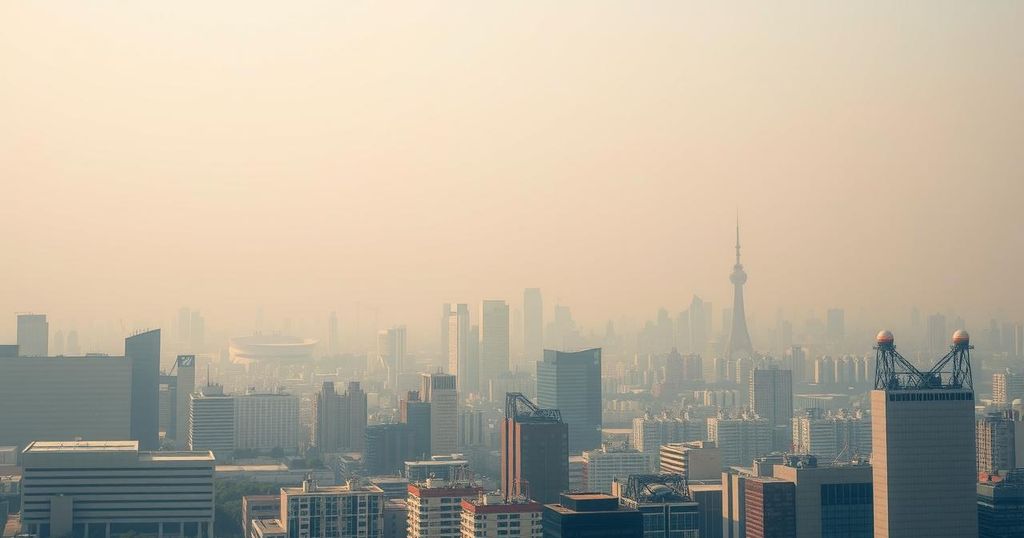Climate change
AFRICA, ASIA, BANGLADESH, CHAD, CHRISTI CHESTER - SCHROEDER, CLIMATE CHANGE, DATA ANALYSIS, ENVIRONMENTAL DAMAGE, EXPORTS, INTERNATIONAL COOPERATION, IQAIR, NORTH AMERICA, REUTERS, SAHARA, STATE DEPARTMENT, SUPPLY CHAIN, UNITED STATES, WHO, WORLD HEALTH ORGANIZATION
Isaac Bennett
0 Comments
Bangladesh and Chad: The Most Polluted Countries in 2024
Bangladesh and Chad were ranked as the most polluted countries in 2024, with Bangladesh exceeding WHO air quality guidelines by over 15 times. Only seven countries met WHO standards last year. The U.S. cessation of its air quality monitoring program poses significant challenges for data availability, particularly in Africa. Climate change is further impacting air quality, with polluted regions witnessing longer forest fires.
In 2024, Bangladesh was reported as the most polluted country worldwide, with air quality levels exceeding World Health Organization (WHO) guidelines by over 15 times, according to data from Swiss air quality monitoring firm IQAir. Bangladesh shares this unenviable ranking with Chad, while India, Pakistan, and the Democratic Republic of Congo also demonstrated severely high levels of pollution.
A recent report highlighted that only seven nations—Australia, New Zealand, the Bahamas, Barbados, Grenada, Estonia, and Iceland—managed to meet WHO air quality standards last year. The overall global air quality picture is complicated by significant data gaps, particularly in Asia and Africa. These regions often depended on air quality readings from US diplomatic facilities.
However, the U.S. State Department recently discontinued this monitoring program due to budget constraints, removing over 17 years of air quality data from its official site, airnow.gov. Christi Chester-Schroeder of IQAir emphasized that the termination of this program will significantly impact Africa due to its reliance on these readings for real-time air quality tracking.
Chad, which was excluded from the IQAir 2023 rankings due to data issues, was previously named the most polluted country in 2022, facing air quality challenges from Sahara dust and uncontrolled agricultural burning. The average concentration of hazardous PM2.5 particles in Chad reached 91.8 micrograms per cubic metre in 2024, a level substantially above the WHO recommendation of 5 mg/cu m, a standard only met by 17% of cities.
India, listed as the fifth most polluted nation, experienced a 7% decrease in PM2.5 levels, averaging 50.6 mg/cu m. Notably, 12 of the top 20 most polluted cities globally are located in India, with Byrnihat documenting the highest PM2.5 level at 128 mg/cu m in a heavily industrialized northeastern region.
Increasingly, climate change is contributing to pollution, resulting in longer and more intense forest fires, particularly affecting regions of Southeast Asia and South America. Christa Hasenkopf, director of the Clean Air Program at the University of Chicago’s Energy Policy Institute, remarked that the closure of the U.S. monitoring program will prevent at least 34 countries from accessing reliable air quality data. Furthermore, she noted that the program had previously improved local air quality, increased life expectancy, and reduced hazard allowances for American diplomats, thus providing a return on investment.
The alarming pollution levels in Bangladesh and Chad, as reported for 2024, underscore significant global air quality challenges, particularly exacerbated by the discontinuation of U.S. monitoring efforts that many developing countries relied upon. As recognized by experts, the intersection of climate change and air quality deterioration presents an urgent call for international cooperation and robust environmental policy reform to combat this growing crisis.
Original Source: bdnews24.com




Post Comment